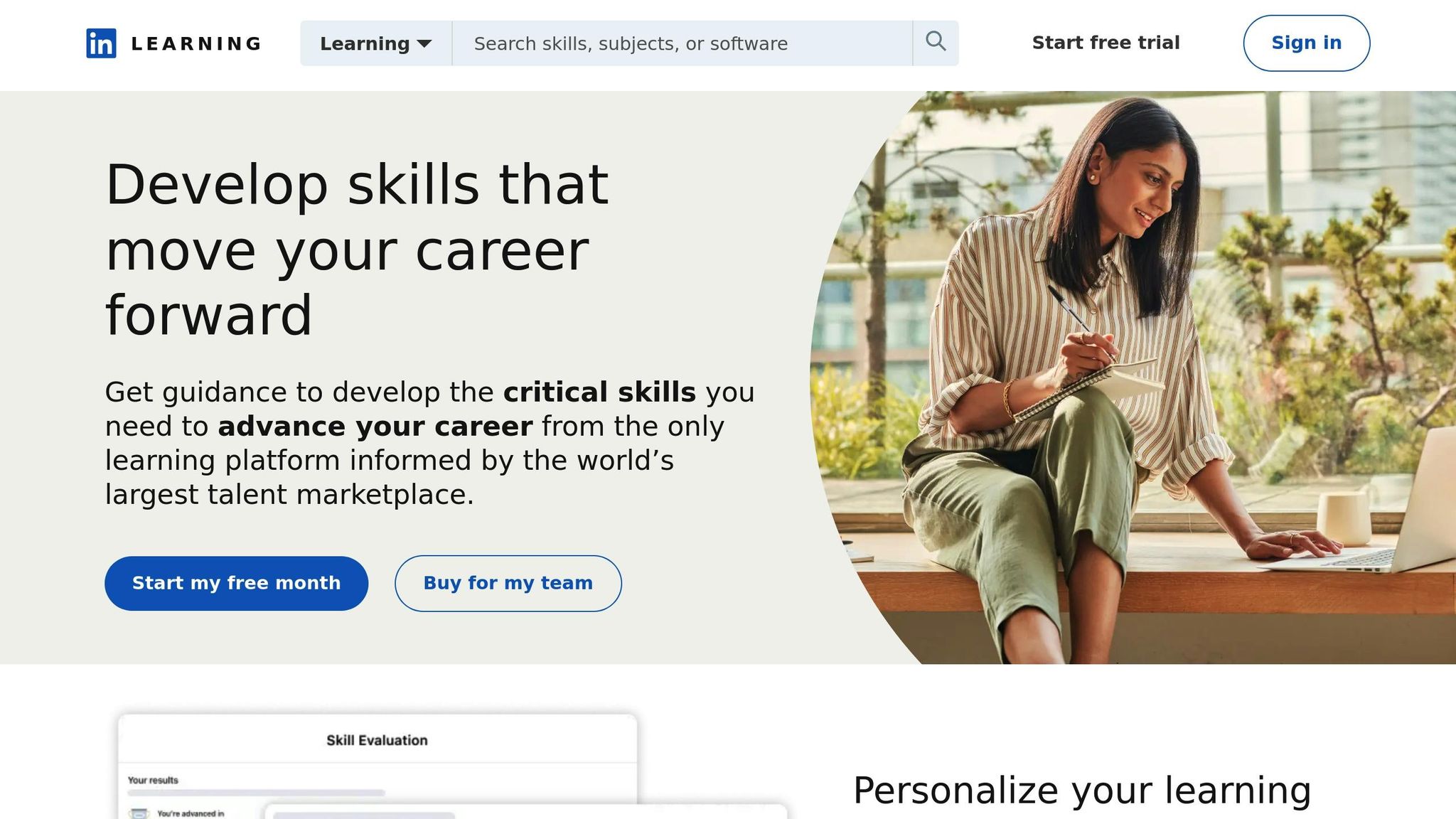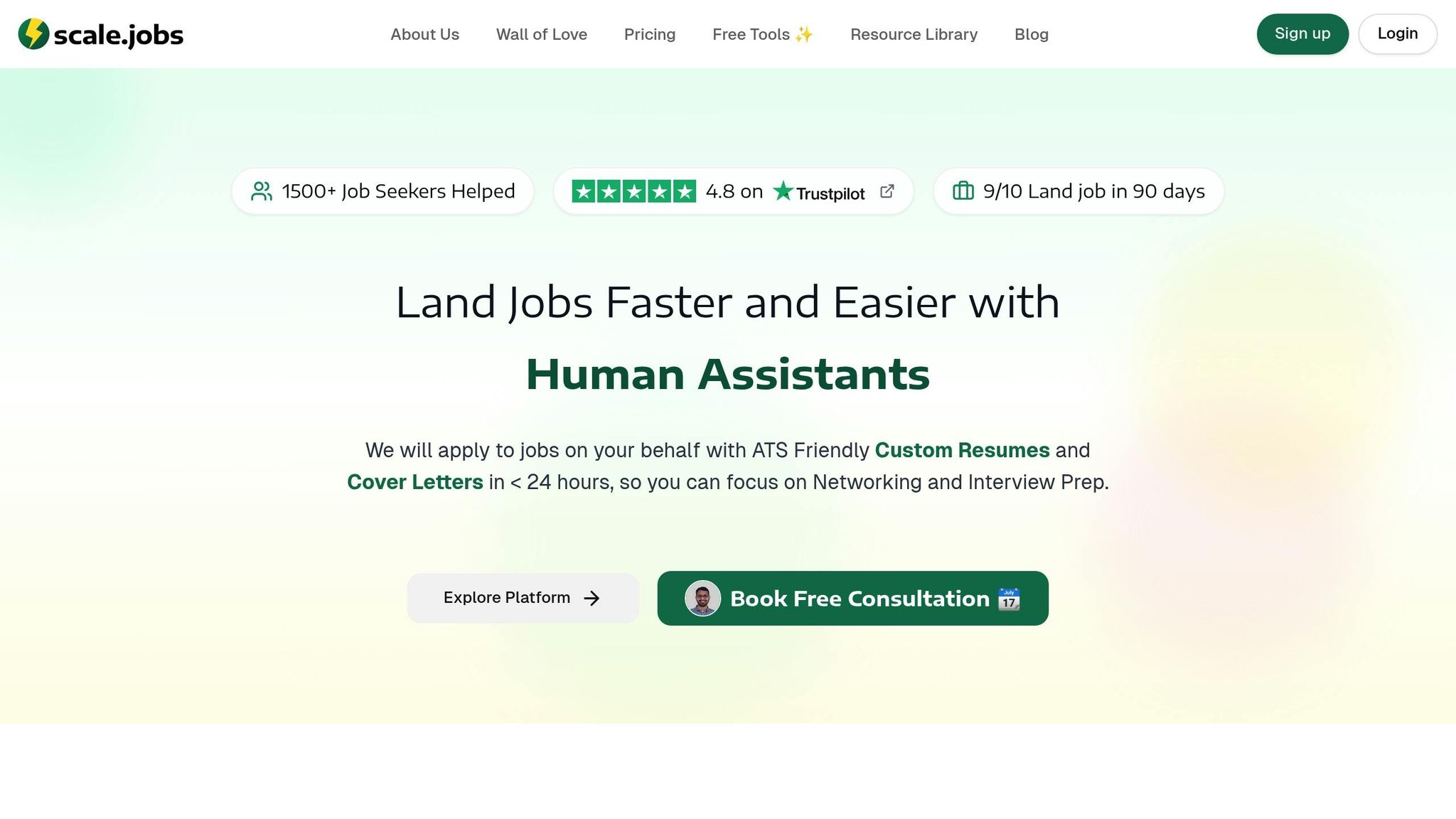Is LinkedIn Learning Worth It for Jobseekers?
Explore the effectiveness of LinkedIn Learning for jobseekers versus platforms that provide direct job application support.

LinkedIn Learning can help you build skills and earn certificates, but it might not be the best option if you're trying to land a job quickly. Here's the breakdown:
- LinkedIn Learning: Offers a wide range of courses for $29.99/month to improve technical and managerial skills. Certificates can enhance your LinkedIn profile but don't guarantee job offers. It focuses on long-term skill-building, not immediate job search support.
- Scale.jobs: Focuses on helping you secure a job faster by providing ATS-optimized resumes, tailored cover letters, and human-assisted job applications. It offers a free tier and flat-fee services, making it a better choice for quick results.
Key Takeaway
If your goal is self-improvement and skill development, LinkedIn Learning is a good investment. But if you're looking for tools to speed up your job search, platforms like Scale.jobs are more effective. Choose based on your priorities: skill-building or job placement.
LinkedIn Learning ROI Analysis

Pricing vs. Value
LinkedIn Learning works on a subscription model, charging a recurring fee for access to its extensive library of courses on a variety of topics. Unlike many job search platforms that offer free basic tools - like resume builders or application trackers - LinkedIn Learning generally requires payment upfront. For jobseekers aiming for fast results, this can be a tough pill to swallow. Recent graduates or professionals dealing with layoffs may find the ongoing subscription cost less appealing, especially if they need immediate job search outcomes rather than long-term skill development.
On the other hand, Scale.jobs takes a different approach with a flat-fee model for its human assistant services. It eliminates recurring costs and even includes a free tier with essential job search tools. For those seeking quick, tangible results, this structure aligns better with their immediate priorities, offering affordable AI assistance and direct support without the burden of ongoing fees.
Job Search Results
While completing courses on LinkedIn Learning can add new skills to your resume, the platform doesn’t provide clear data on how those certifications directly impact job offers or interview invitations. Gaining skills is just one part of the job-hunting equation, and it doesn’t necessarily address the challenges of standing out in applicant tracking systems (ATS).
Platforms that simplify the application process and help candidates get past ATS filters can often make a bigger difference, especially for those on tight timelines. For jobseekers who need to connect with recruiters quickly, tools that focus on direct support may deliver more immediate results than the broader, long-term benefits of online courses. This distinction sets the stage for a deeper look at ROI comparisons.
ROI Comparison with Other Platforms
When comparing ROI, LinkedIn Learning competes with both educational platforms and job search tools. Platforms like Coursera and Udemy offer similar learning content, often with the option to purchase individual courses instead of committing to a subscription. This flexibility can appeal to learners who want to avoid recurring costs.
However, for jobseekers, the more relevant comparison is between platforms focused on skill-building and those offering direct job application assistance. Scale.jobs stands out by handling the heavy lifting of tailoring resumes and cover letters, allowing jobseekers to focus on networking and interview preparation. It also provides transparency through real-time updates via WhatsApp and proof-of-work screenshots, showing exactly how your investment translates into personalized job applications and interview opportunities. This clear, measurable approach often delivers faster results compared to the longer-term payoff of completing online courses, making it a compelling choice for those prioritizing immediate outcomes.
Course Quality and Skill Development
Course Selection and Job Relevance
LinkedIn Learning boasts a vast catalog of courses, offering theoretical insights across various fields. However, it often falls short when it comes to hands-on, practical skills that employers actively seek. Its general guidance for job searches tends to overlook the specific nuances required for optimizing resumes for applicant tracking systems (ATS), leaving a gap in targeted job preparation.
On the other hand, Scale.jobs steps in where LinkedIn Learning leaves off. It focuses on job application essentials, providing tools like ATS-optimized, job-specific resumes that directly address the needs of modern job seekers. This practical, results-driven approach bridges a critical gap, making it more relevant for those who need immediate, actionable support in their job search.
While course variety is important, what truly makes a difference is how well the training aligns with the current market demands and how actionable the learning outcomes are.
Course Standards and Market Alignment
LinkedIn Learning is recognized for its polished production quality, offering professionally crafted videos and structured learning paths. However, as industries evolve rapidly, some of its courses may lag behind, focusing on established principles rather than integrating the latest trends or innovations. This can leave learners with knowledge that feels slightly out of step with what’s happening in the job market today.
In contrast, Scale.jobs ensures its guidance stays current by offering real-time, market-aligned strategies. With the added advantage of personalized feedback from human assistants, it tailors its support to meet the ever-changing demands of the job market. This approach transforms skill-building into actionable plans that job seekers can immediately apply to their applications.
Ultimately, while LinkedIn Learning can be a valuable resource for broadening knowledge and skills, it works best as a supplement to platforms like Scale.jobs, which focus on delivering immediate, market-driven results. For jobseekers aiming to secure interviews and offers, combining theoretical learning with practical, real-time tools is key.
Certificate Value and Employer Recognition
LinkedIn Learning Certificate Benefits
Adding LinkedIn Learning certificates to your profile can boost your visibility on the platform. These certificates show up in the skills section and are automatically highlighted in your network, making them more noticeable to recruiters. This integration helps showcase your commitment to learning.
That said, certificates alone won’t guarantee job offers. Applicant Tracking Systems (ATS) often filter resumes based on keywords and formatting, which means a certificate won’t bypass these systems unless your resume is optimized. This is a key factor in how hiring managers assess the value of such credentials.
Hiring Manager Perspectives
For most hiring managers, LinkedIn Learning certificates are a nice addition but not a game-changer. They demonstrate your willingness to learn and grow but don’t carry the same weight as real-world experience, a strong portfolio, or certifications from specialized organizations. What employers prioritize is evidence of your ability to perform the job. This includes an ATS-friendly resume, personalized cover letters, and a well-thought-out application process that stands out in a crowded pool of candidates.
Courses in areas like project management or data analysis can be useful, but their impact depends on how effectively you present these skills. Without tying them to measurable achievements or optimizing your job application materials, their value may remain limited.
Alternative Platform Comparison
Because of these limitations, many job seekers turn to platforms that focus on results rather than just skill-building. For instance, Scale.jobs is designed to turn your skills into job offers, addressing the practical challenges that certificates alone can’t solve. While LinkedIn Learning emphasizes personal development, Scale.jobs prioritizes helping users land jobs.
The platform claims to reduce average job search times from 5 months to just 1–3 months, with 93% of users securing a job within 3 months. It boasts a 4.8/5 rating from over 1,500 job seekers and offers transparent updates throughout the application process.
"Such a great initiative and service! Applying jobs everyday has been super daunting. But now with Scale.jobs, one can apply 100s of jobs per day as well as focus on prep for interviews." – Sona Tambe
What sets Scale.jobs apart is its human-assisted approach. Instead of leaving users to manage their job search alone, trained professionals handle the application process. Features like WhatsApp support, real-time updates, and proof-of-work screenshots ensure a more guided experience.
Interestingly, 70% of Scale.jobs users receive refunds because they secure a job before using all their credits. With 9 out of 10 customers landing a job within 90 days, the platform proves its ability to convert skills into tangible opportunities.
For job seekers, the choice often comes down to what you need most: building new skills or improving your job search strategy. LinkedIn Learning certificates can enhance your qualifications, but platforms like Scale.jobs focus on turning those qualifications into actual job offers through strategic, hands-on support.
LinkedIn Learning vs. scale.jobs and Competitors

Platform Feature Comparison
LinkedIn Learning is a great tool for building expertise, but it doesn’t bridge the gap between learning new skills and landing interviews. This is where scale.jobs steps in, tackling the real-world challenges of job hunting by simplifying the application process from start to finish.
LinkedIn Learning operates on a subscription-based model, offering access to thousands of courses to help users develop new skills. However, while these courses enhance knowledge, they don’t provide direct access to hiring managers or streamline the job application process.
On the other hand, scale.jobs is designed with job seekers in mind. Its free tier includes tools like an ATS-compliant resume builder, a job application tracker, and resources such as salary predictors and interview question generators. For those looking to stand out, the platform also offers AI-powered customization for resumes and cover letters, ensuring applications are tailored to specific roles.
What really sets scale.jobs apart, though, is its Human Assistant services. These trained virtual assistants and reverse recruiters handle everything - from crafting ATS-optimized resumes and personalized cover letters to submitting applications across various platforms, whether it’s a corporate ATS or a smaller, niche job board.
While other platforms may focus on isolated features like ATS optimization or automated application tools, scale.jobs brings everything together. Its combination of free tools, AI-driven customizations, and hands-on human assistance creates a comprehensive experience that LinkedIn Learning’s skill-focused model simply can’t match.
Why scale.jobs Outperforms LinkedIn Learning
For job seekers looking for a complete solution, here’s why scale.jobs stands out as a better option than LinkedIn Learning:
- Human-powered application management: Instead of relying on automated processes, scale.jobs employs trained professionals to manually complete application forms. This reduces the risk of errors or issues like bot detection, which can derail applications.
- ATS-optimized resumes and cover letters: scale.jobs ensures your documents are tailored to navigate Applicant Tracking Systems effectively. While LinkedIn Learning might teach you about ATS strategies, it doesn’t offer tools to optimize your actual applications.
- Clear pricing and real-time updates: With scale.jobs’ flat-fee model for its Human Assistant services, there are no recurring subscription fees. Plus, you get timestamped screenshots of submissions, live updates via WhatsApp, and detailed progress reports.
- Free job search tools: The platform includes resources like an ATS resume checker, cover letter generator, and interview question predictor - all available at no cost. These tools, paired with professional optimization services, give you a head start without requiring a subscription.
- Compatibility across all portals: Whether you’re applying through a major corporate ATS or a niche job board, scale.jobs ensures your application reaches the right places for maximum visibility.
- Support for international job seekers: For candidates dealing with visa requirements like H1B, F1, or CPT, scale.jobs offers specialized guidance that goes beyond the general advice available on LinkedIn Learning.
LinkedIn Learning Advantages and Disadvantages
Pros and Cons Summary
LinkedIn Learning offers a unique benefit: the ability to showcase course certificates directly on your LinkedIn profile, boosting visibility with recruiters and hiring managers. The platform provides a wide range of professional courses with impressive production quality, making it a solid resource for skill-building across different industries. Plus, it's mobile-friendly, allowing you to learn on the go.
That said, there are some drawbacks. Here's a quick breakdown of LinkedIn Learning's strengths and weaknesses:
| Advantages | Disadvantages |
|---|---|
| Certificates displayed on your LinkedIn profile | Subscription fees can be expensive |
| Wide variety of professional courses | Certificates may not carry significant weight with employers |
| Mobile accessibility for learning anywhere | No dedicated tools for job applications or resume building |
| High-quality production and structured learning paths | Focus is limited to skill development, not job placement |
While LinkedIn Learning is excellent for improving skills, it’s not a complete solution for jobseekers. For those actively applying for jobs, tools like scale.jobs can fill the gap by addressing resume optimization and the application process. Think of LinkedIn Learning as a way to enhance your expertise, while platforms like scale.jobs help you turn that expertise into career opportunities.
Best Platform Recommendations by Jobseeker Type
Who Should Use LinkedIn Learning
LinkedIn Learning is ideal for individuals who want to build their skills gradually. Whether you're a mid-career professional looking to update your expertise or a recent graduate eager to expand your industry knowledge, this platform offers courses and certificates that can strengthen your profile over time. It's a great choice for those focused on self-improvement and long-term career growth, rather than immediate job applications.
When scale.jobs Works Better
If you're in a situation where time is of the essence, scale.jobs offers a more targeted solution. This platform is particularly helpful for laid-off professionals and international candidates who need quick results. Its human-assisted application process streamlines job submissions, giving you more time to focus on interviews.
For international jobseekers, scale.jobs provides tailored strategies to address visa sponsorship requirements, which is crucial for navigating programs like H1B or F1. Unlike platforms centered around skill-building, scale.jobs emphasizes creating ATS-compliant resumes and applications that stand out to hiring managers.
With scale.jobs, you can reclaim valuable hours - up to 20 per week - by outsourcing tedious application tasks. This flat-fee service eliminates the need for recurring subscriptions, making it an efficient and cost-effective option for those seeking immediate results.
Key benefits of scale.jobs include:
- Human-assisted application submissions for faster outcomes
- Customized support for visa sponsorship needs
- ATS-optimized resumes designed to pass automated filters
- Flat-fee pricing, offering savings compared to subscription-based platforms
The choice between these platforms comes down to your priorities. If you're aiming to enhance your skills for future opportunities, LinkedIn Learning is the way to go. But if you need to land a job quickly, scale.jobs provides a results-driven approach tailored to your immediate needs.
Linkedin Learning Review 2025 - Is LinkedIn Learning Worth it?
Final Verdict: LinkedIn Learning Worth It?
LinkedIn Learning provides a structured way to build skills, making it a great choice for recent graduates or professionals looking to switch careers. It’s especially useful for those wanting to enhance their portfolio and demonstrate a commitment to personal growth right on their LinkedIn profile.
That said, if you’re under pressure to land a job quickly - whether due to layoffs, visa deadlines, or financial concerns - LinkedIn Learning might fall short. It focuses on education but lacks key tools for job searching, like ATS optimization, application tracking, or the ability to submit applications across multiple platforms.
On the other hand, scale.jobs prioritizes action. Its flat-fee service combines human assistance with tools designed to speed up your job search.
The best option depends on your priorities. If you’re aiming to grow your skills over time, LinkedIn Learning is a solid pick. But if you need immediate results in your job hunt, scale.jobs might be the better route.
FAQs
Is LinkedIn Learning a good choice for jobseekers compared to platforms like Coursera or Udemy?
LinkedIn Learning is a solid option for jobseekers aiming to sharpen their skills, earn certifications, and enhance their professional profiles. One of its standout features is the seamless integration with LinkedIn, allowing users to display completed courses directly on their profiles - a feature that can help catch the attention of recruiters.
When compared to other platforms like Coursera or Udemy, LinkedIn Learning leans heavily toward career-focused courses. However, it may not offer the same depth or variety. Coursera often shines with its university-backed certifications, while Udemy provides an extensive array of affordable, niche courses. The best platform for you will depend on your career objectives and how you prefer to learn.
Do LinkedIn Learning certificates help improve job prospects, or are they just a nice addition?
LinkedIn Learning certificates can help improve your job prospects, but their real value depends on how you leverage them. These certificates show your dedication to learning and can emphasize skills that align with the roles you’re aiming for. They’re particularly useful in fields like tech, marketing, and project management, where staying current and earning certifications are often appreciated.
However, these certificates alone won’t land you a job. To maximize their impact, combine them with hands-on experience, active networking, and a solid job search plan - such as those supported by platforms like scale.jobs. Employers are often more interested in how you apply your knowledge, so be sure to highlight your skills on your resume or portfolio to make these certifications work in your favor.
How does scale.jobs benefit international jobseekers compared to LinkedIn Learning?
LinkedIn Learning is all about building skills through courses and certifications, which can give your resume a boost and broaden your knowledge base. But if you're actively hunting for a job, especially as an international candidate, scale.jobs takes a different route. It offers a hands-on approach, blending job search tools, AI-driven support, and real human assistance to make finding and applying for jobs simpler.
For international jobseekers, scale.jobs goes the extra mile. It provides tailored resumes designed to work seamlessly with ATS systems, visa-specific job search help, and even human assistants who handle your applications from start to finish. This means less stress, more time saved, and fully customized applications - helping you tackle the unique challenges of cross-border job hunting with confidence.




